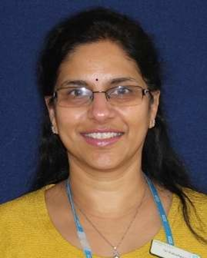

Inspirational Story
Sri Kakarlapudi
What subjects did you study at school?
I completed my Undergraduate and post graduate education back home in India. For my base degree, I did Home Science, where one of the main subjects was Nutrition alongside Home Economics, Child Psychology, Biochemistry and Human Physiology
Having developed an interest in Nutrition, I completed my postgraduate diploma in Nutrition Dietetics from Padmavathi University for Women, Tirupati, AP, India.
When I came to this country I applied for my HCPC registration at which point I was recommended to complete a ‘Top Up’ for my qualifications and a short placement to update myself to UK systems. I completed this at Cardiff University. In addition I also completed MSc in Diabetes Care from York University.
What influenced your choice of profession?
I have always been interested in food and my passion is for people to understand that food is your first option to keep yourself healthy, not medication. Medication comes afterwards. Everything’s becoming overly medicalised and we’re not looking at the first option at all.
What were your expectations of the profession?
I think that one of the things is that you just expect to be part of your Multi-Disciplinary Team (MDT).
Everyone knows you as a dietitian and what you can do. But when you actually start working you realise that you often have to fight your way through to make an impact because dietitians can sometimes be invisible.
You have to work hard to make sure people remember that you’re there to support your patients. When you see your consultants fighting for you and recognising the work you do, that’s great.
Have you had any lightbulb moments during your career?
I’m not sure about any specific lightbulb moments because I think you learn all the time. I think my learning has been constant. I’ve never stopped.
I’ve learned not to be negative about things, looking at situations as positively as you can and understanding that if you want to make a difference, you need to stay positive and motivated.
I feel passionate about making a difference to improve the experiences of staff from diverse backgrounds who may have experienced discrimination and prejudice
What does your current role look like day to day?
So my role used to be clinical, seeing patients daily which I found very rewarding. Coming into a management role I don’t have time to work clinically very often. I’d love to do more but I just can’t fit it in because then I wouldn’t be able to support my team as much as I do.
During my day I look at how my team are doing, offering support to my team. I have an open door policy as well, so anyone (including students) can knock on my door and come and chat.
I like to deal with any issues rather than putting them off. I take comfort in the fact that issues have often been resolved before they become a bigger issue.
There are a lot of management processes that I need to do, such as reporting and results. I also put a lot of emphasis on developing the services finding opportunities where Dietetics has previously not ventured, an example being Dietitians taking on extended roles.
I also like finding opportunities for staff to showcase their work and their positive achievements, so I regularly nominate them for different awards.
We’ve been on the top 10 shortlist for national HSC awards three times and we’ve presented at International Dietetics conference in Granada.
I am also involved in the new Regional AHP Ethnic Minority Network because I feel passionate about making a difference to improve the experiences of staff from diverse backgrounds who may have experienced discrimination and prejudice.
How you come to become in the position you are in now?
I think a lot of hard work and passion for the profession.
How can you be in a profession without being passionate about it?
I have also been well supported by my managers and encouraged to apply for promotions.
What you love about your role?
I love my profession and I love the work I do.
I’m willing to put the work in to make sure people are aware of our services and the help we give to the patients.
I love my team – they’re fantastic and I am so proud of them. I like my team to know their hard work is recognised, that I’m there for them and that I will support them.
I want them to shine and show their passion because they’re so happy in their job.
Dietitian
Want to learn more about the role of a Dietitian, the different areas they can work in and specialisms?
Find out more